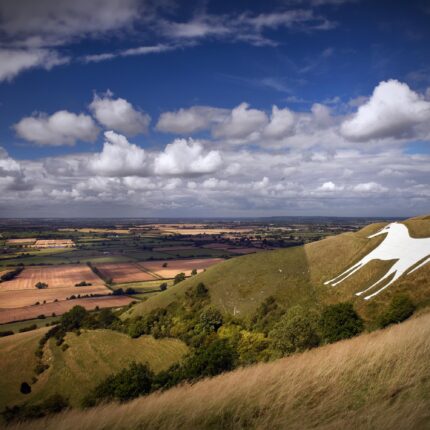
Lessons for restoration from the Wiltshire wilderness
20 Oct 2025
This article was first published in The Critic
Why is a Mayfair think-tank marching its members up a rain-sodden hill in the middle of deepest Wiltshire? Why are they tromping through the wind and mud with a tweed-clad Sir Jacob Rees-Mogg in search of an isolated battlefield where King Alfred trounced the Vikings in 878? Why have they forsaken their comfortable London library and coffee machine — surely an easier venue for thinking — to struggle by way of winding roads and the decaying remains of South West Rail via Yeovil Junction towards the mysterious heart of Angleterre profonde?
What is the purpose of a think tank? Surely it should be the fine-toothed consideration of the minutiae of policy, the dispassionate and forensic weighing up of what things work and what things do not. For such, beyond anything, we are told, is the business of government: delivery, outcomes, making things work. In the ideal, so the theory has increasingly been, governance is a scientific sort of occupation, whose practitioners put aside all ideology to focus on nudging an ever more complex bureaucracy this way and that, in the hope that a hair’s-breath tuning of the wheel of the ship of state will produce a percent or two more of some sort of benefit here or there.
This doctrine of managerialism has been the lodestar of the ship of state certainly since Blair, and perhaps even since the 1980s. And governments, slavishly following it, have allowed us to drift into stormy waters. In a myopic pursuit of a percent or two’s benefit, they have lost sight of the fundamentals that make English and British society. What is our identity? What binds us together? Where have we come from, and where should we be going? You can lavish those extra one or two percents on society all you like, but if society is fragmenting through lack of a cohesive vision, then what’s the good of it? “Where there is no vision, the people perish”, says the Book of Proverbs. What better proof of this than England in 2025?
This certainly isn’t the first time, however, that England has been close to perishing. Indeed, thanks to the Vikings, it nearly perished in the ninth century before it could even come to full birth. In 878, the Great Heathen Army of the Danes under the chieftain Guthrum came within an ace of extinguishing Wessex, the last Anglo-Saxon kingdom that had not fallen to them. Alfred the Great, King of Wessex, was forced to retreat into the wilderness of the Somerset Levels at the isle of Athelney, from where he was able to rally his men and ultimately defeat Guthrum at Edington in May 878. The worsted Viking chieftain agreed to be baptised and to confine his claims to East Anglia and the north east. Alfred was left with Wessex and half of Mercia, and from here, the future kingdom of England would come into being.
It is a retreat into this wilderness, and a contemplation of a place and of a king who saved his people from perishing, that are worthy antidotes for contemporary practitioners of government who want to regain a vision of England that has been lost in the managerial corridors of Whitehall. Alfred laid the foundations for England to come into being and endure not just by his military prowess but also through conceiving a durable and inspiring vision for the nation. It is a vision that is again worthy of study.
In pursuit of this, the Prosperity Institute’s Edington Fellows (named for the crucial battle) — young professionals training for public-service careers in their various fields of policy, journalism, law and research — came together near the battlefield in a wet Wiltshire with the Institute’s Radomir Tylecote (its Managing Director), Samuel Bruce, and Clara Morrissey, for their first training day away from London.
What can one learn of the vision of a ninth-century king? Before anything, Alfred was deeply influenced by the eighth-century monk and scholar, the Venerable Bede. Bede himself drew deeply from the Bible and the model of Old Testament Israel for ideas of nationhood. Despite the Anglo-Saxons of his time being ethnically disparate and divided between many warring kingdoms, Bede had a vision of them as one people, the English, united with one church under God, and with an aspiration to be a unified nation under one king. For Bede, English unity was crucial. It was attained regardless of ethnic origin — Saxon, Angle, Jutish, Frisian, Roman, Celtic, even Italian or Asiatic Greek immigrant (like Archbishop Theodore of Tarsus) — by shared adherence to the Christian faith as brought back to the land by Roman missionaries.
Bede’s work proclaimed a sense of destiny for England. He was the first historian to tie the very dates of British history into the BC/AD dating system, linking the happenings in these islands to the cosmic events of the coming of Christ and the rise and fall of Rome. What happened in Britain now seemed to have a part in this great drama, and England’s role was not just to receive Christianity from Rome, but to pass it on to the remaining heathen of Europe. The English were now a people with a mission.
Bede also drew from the Bible a new pattern for kingship and governance. No longer were kings to be merely as amoral warlords. Their examples were the Old Testament kings, and Christ himself. Kingship was a vocation. Its essence was service and humility. The great kings, such as Oswald and Edwin of Northumbria, protected the faith, shared their wealth with the poor, and concerned themselves with the safety and well-being of their people. More than all of this, their will was not absolute. They were answerable to God both for the conduct of their people as well as themselves, and thus, as later became a constant refrain through English history, “the king is under God and the law.”
Bede’s ideas were fundamental for Alfred. He did all he could to pursue the vision of national unity. He saw that to achieve this common culture was essential. He encouraged all freemen of means to learn to read English. To this end, he lighted on a series of books that he said were “most necessary for all men to know”, which he had translated into English – works of religion, philosophy and history, including Bede, which envisaged a strong and prosperous nation dedicated to education, morality and the rule of law.
For the latter, as the scholar Ofir Haivry observed to the Fellows, Alfred’s work laid the foundations for the common law. Not only did he draw from the Ten Commandments and other biblical injunctions to create a shared law code for all based on Christian morality. He also developed the biblical practice of oath-taking as a cornerstone of the legal system. To break an oath, especially of obedience to the king and the law, became a terrible offence. They were used to underpin systems of taxation and military service. Such was the sanctity attached to oaths that they could be used to prove the innocence of those at trial, by having several others swear to that innocence. One’s place in the community, therefore was dependent on one’s oath-worthiness. One could only secure it by being trustworthy and having a good reputation. Thus, the use of this biblical device served to build mutual trust, order and peaceful cohesion in developing English society in a way that was to endure for centuries.
There was something powerful in contemplating these ideas in an ancient landscape which had seen crisis and recovery. A return to these points of high history in the wilderness is often the route to restoration. As Jacob Rees-Mogg observed, at times of stress in English and British history, the call was never for outright revolution or a break with the past, but for restoration of the old laws, rights and liberties. When changes were necessary, the old ideas were still the bedrock of a new settlement, and evolution was always the order of the day.
The antiquity and persistence of the ideas derived from Alfred and Bede — persistent at least until the virtual cultural revolution of the 1960s with its rejection of Christianity and the authority of the past — means that they are not distant history. They make for the spirit of our constitution, a spirit that we need to relearn. At a time when we are trying to understand what it is to be English, or British, to bring back a sense of mission, duty and probity in government and public life, to rebuild decaying ideas of social cohesion and service, we should return to contemplate those who achieved these feats, and not even with the benefit of a calm centrally-heated London library, but out on the precarious paths of a rainswept Wiltshire hill.

